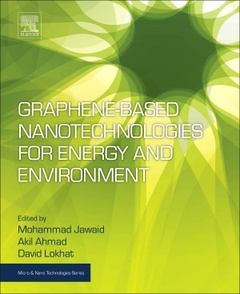Description
Graphene-based Nanotechnologies for Energy and Environmental Applications
Micro and Nano Technologies Series
Coordinators: Jawaid Mohammad, Ahmad Akil, Lokhat David
Language: English
Subject for Graphene-based Nanotechnologies for Energy and...:
Keywords
Adsorption–desorption mechanism; Adsorption; Application; Biomedical; Biosensors; Characterization; Chemical vapor deposition; Composite materials; Composite; Composites; Conductivity; Cyclic voltammetry; Doped graphene; Dye treatment; Dye; Dyes; Electrochemistry; Electron mobility; Electron–hole pairs; Energy storage devices; Energy storage; Energy; Environment; Extraction; Filters; Fuel cells; Graphene derivatives; Graphene nanofiller; Graphene oxide frameworks; Graphene oxide; Graphene/ metal oxide composite; Graphene; Graphene-based materials; Graphene-based nanocomposite materials; Graphene-oxide; Heavy metal ions; Heavy metal; Heavy metals; Hollow fiber; Hydrogen adsorption; Hydrogen fuel cells; Hydrogen fuel; Hydrogen storage; Indoor air; Liquid-phase exfoliation; Lithium batteries; Lithium-ion batteries; Lithium-ion; Magnetite graphene oxide; Marine pollution; Mechanism; Membrane; Microbial pathogens; Nanocomposite; Nanohybrid; Nanoparticles; Nanotechnology; Organic pollutants
446 p. · 19x23.3 cm · Paperback
Description
/li>Contents
/li>Readership
/li>Biography
/li>Comment
/li>
Graphene-Based Nanotechnologies for Energy and Environmental Applications explores how graphene-based materials are being used to make more efficient, reliable products and devices for energy storage and harvesting and environmental monitoring and purification. The book outlines the major sustainable, recyclable, and eco-friendly methods for using a range of graphene-based materials in innovative ways. It represents an important information source for materials scientists and engineers who want to learn more about the use of graphene-based nanomaterials to create the next generation of products and devices in energy and environmental science.
Graphene-based nanotechnologies are at the heart of some of the most exciting developments in the fields of energy and environmental research. Graphene has exceptional properties, which are being used to create more effective products for electronic systems, environmental sensing devices, energy storage, electrode materials, fuel cell, novel nano-sorbents, membrane and photocatalytic degradation of environmental pollutants especially in the field of water and wastewater treatment.
Section 1: Introduction 1. Introduction of graphene-based nanotechnologies 2. Survey of graphene-based nanotechnologies 3. Graphene-based materials: energy and environmental applications
Section 2: Energy 4. The potential application of graphene nanotechnology for renewable energy systems 5. Role of graphene in photocatalytic water splitting for hydrogen production 6. Metal-doped graphene nanocomposites and their application in energy storage 7. Graphene oxide/transition metal oxide as a promising nanomaterial for hydrogen storage 8. Development of graphene-based nanocomposites as potential materials for supercapacitors and electrochemical cells 9. Energy storage properties of graphene nanofillers
Section 3: Environment 10. Graphene as a superior material for detection of volatile organic compounds 11. Application of magnetite-graphene oxide for wastewater treatment 12. Nanomaterials-based on graphene oxide and its derivatives-for separation and preconcentration of metal ions 13. Graphene/metal oxide-based nanocomposite as photocatalyst for degradation of water pollutants 14. New generation graphene oxide for removal of polycyclic aromatic hydrocarbons 15. Fabrication of graphene-based membrane for separation of hazardous contaminants from wastewater 16. Antimicrobial activity of graphene-based nanomaterials: current developmentand challenges 17. Graphene-metal oxide-supported nanohybrid materials for treatment of textile dyes 18. Graphene-based nanomaterials for the removal of pharmaceuticals in drinking water sources 19. Fabrication and application of graphene-based composites for indoor air filters and waste water treatment 20. An overview of porous graphene nanomaterials for wastewater treatment
materials scientists, environmental chemists, chemical engineers and environmental engineers.
Dr. Mohammad Jawaid is currently affiliated with the Department of Chemical and Petroleum Engineering at United Arab Emirates University. Previously he was a senior fellow (professor) in the Laboratory of Biocomposites Technology at the Institute of Tropical Forestry and Forest Products (INTROP), Universiti Putra Malaysia. He is an eminent scientist with more than twenty years of teaching, and research experience in composite materials. His research interests include hybrid reinforced/filled polymer composites, and advanced materials such as graphene/
nanoclay/fire retardant, lignocellulosic reinforced/filled polymer composites, and the modification and treatment of lignocellulosic fibres and solid wood, and nanocomposites and nanocellulose fibres.
Akil Ahmad is a Research Fellow at University of KwaZulu Natal, South Africa as Postdoctoral Fellow. He was previously Visiting Researcher of Chemical Engineering, Centre of Lipid Engineering and Applied Research, University Technology Malaysia (UTM), Malaysia. His research interest in the areas of environmental pollutants and their safe removal, synthesis of nanoparticles and Nano-sorbents (GO, CNT), photo-degradation and antimicrobial effects, preparation of various Chelating sorbents/adsorbent to prevent the environment, water and wastewater treatment, adsorption and ion-exchange, instrumental methods of analysis, thermodynamic and kinetic studies, and preconcentration and method validation with standard reference materials.
David Lokhat is Senior Lecturer at the School of Engineering at KwaZulu Natal University, South Africa. His primary research interests are in catalysis and reactor engineering, specifically micro-scale engineering, thermal processing of biomass, surface treatment of polymers and applications in fluorochemistry
- Covers synthesis, preparation and application of graphene based nanomaterials from different sources
- Demonstrates systematic approaches to the design, synthesis, characterization and applications of graphene-based nanocomposites in order to establish their important relationship with end-user applications
- Discusses the challenges in ensuring reliability and scalability of graphene-based nanotechnologies




